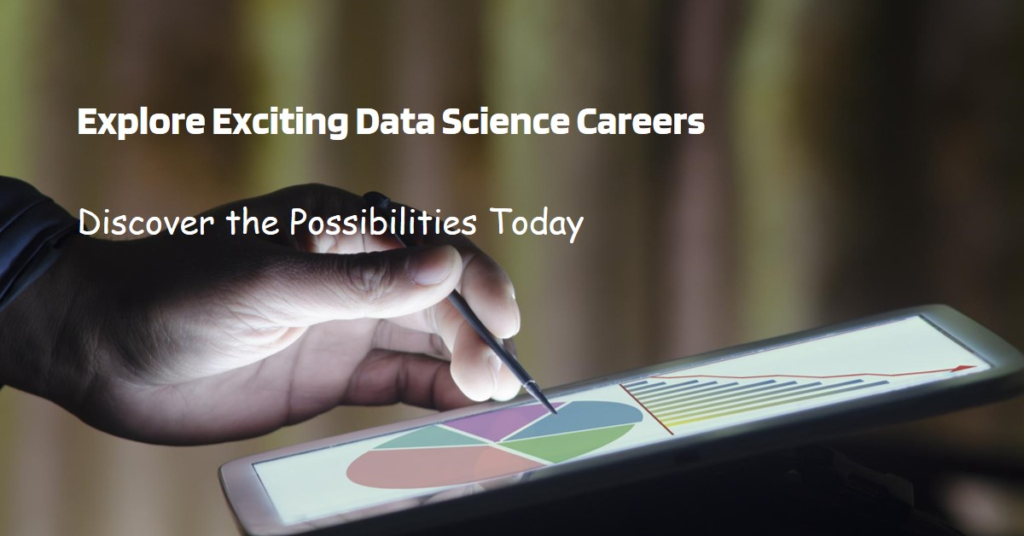
Data Science Careers Demystified: Essential Skills, Job Opportunities, and Career Paths
In today’s fast-paced digital landscape, data science has emerged as a key player in driving innovation, making it a sought-after career choice for many. This article aims to demystify the world of data science careers, exploring the essential skills required, the plethora of job opportunities available, and the diverse career paths one can take within this dynamic field.
Introduction
Essential Skills for Data Science Careers
Technical Skills
1. Proficiency in Programming Languages
The backbone of any data scientist lies in their coding skills. Proficiency in languages such as Python, R, and SQL is non-negotiable.
2. Data Visualization Skills
Translating complex data into comprehensible visuals is a crucial skill. Tools like Tableau and Power BI are commonly used in this aspect.
3. Machine Learning and Statistical Knowledge
A deep understanding of machine learning algorithms and statistical methodologies is vital for making sense of data patterns.
Analytical Skills
1. Critical Thinking
Data scientists need to approach problems with a critical mindset, questioning assumptions and exploring unconventional solutions.
2. Problem-Solving Abilities
The ability to solve complex problems efficiently is a hallmark of a successful data scientist.
3. Attention to Detail
In a field where precision matters, attention to detail is indispensable to avoid errors that could lead to misinterpretation.
Soft Skills
1. Effective Communication
Being able to convey complex findings to non-technical stakeholders is a skill that distinguishes an excellent data scientist.
2. Team Collaboration
Data science projects often involve interdisciplinary teams; hence, collaboration and effective communication are key.
3. Business Acumen
Understanding the business context behind the data is critical for providing insights that drive decision-making.
Job Opportunities in Data Science
Data Analyst
Responsibilities and Key Tasks
Data analysts focus on interpreting and analyzing data to help companies make informed decisions.
Qualifications and Skills Required
A bachelor’s degree in a related field and proficiency in data analysis tools are typical requirements.
Data Scientist
Role and Responsibilities
Data scientists delve deeper into data, employing advanced analytics and machine learning to derive actionable insights.
Educational Background and Experience
A master’s or Ph.D. in data science or a related field is often preferred, along with relevant work experience.
Machine Learning Engineer
Scope of Work
Machine learning engineers design and implement algorithms that enable systems to learn and improve from experience.
Technical Skills Needed
Strong programming skills, knowledge of machine learning frameworks, and experience in deploying models are essential.
Diverse Career Paths in Data Science
Industry-Specific Paths
1. Healthcare
In healthcare, data scientists contribute to improving patient outcomes, optimizing operations, and advancing medical research.
2. Finance
The finance sector relies on data scientists for risk analysis, fraud detection, and algorithmic trading.
3. E-commerce
Data science enhances e-commerce by personalizing user experiences, predicting customer preferences, and optimizing supply chain operations.
Specializations
1. Natural Language Processing (NLP)
Data scientists specializing in NLP work on developing algorithms that understand and generate human language.
2. Computer Vision
In this specialization, data scientists focus on teaching machines to interpret and make decisions based on visual data.
3. Predictive Analytics
Predictive analytics involves using statistical algorithms to forecast future trends and behaviors based on historical data.
Navigating the Educational Landscape
Formal Education
Degrees in Data Science
Many universities offer bachelor’s, master’s, and Ph.D. programs in data science, providing a structured educational path.
Certifications and Their Value
Industry-recognized certifications, such as those from AWS or Microsoft, can boost one’s credibility in the job market.
Self-Learning
Online Courses and Resources
Platforms like Coursera and Udacity offer a plethora of online courses, allowing individuals to tailor their learning to specific skills.
Building a Personal Portfolio
Creating a portfolio showcasing projects and real-world applications is invaluable for those without formal education.

Challenges and Opportunities in Data Science Careers
Perplexities in the Field
Rapid Technological Advancements
Staying abreast of the latest technologies is a constant challenge, but it also presents opportunities for innovation.
Ethical Considerations
Data scientists face ethical dilemmas, such as privacy concerns and biased algorithms, requiring thoughtful solutions.
Burstiness of Opportunities
Emerging Fields and Trends
New technologies like edge computing and blockchain are creating new avenues for data scientists to explore.
Global Demand for Data Science Professionals
As businesses worldwide recognize the value of data, the demand for skilled professionals continues to skyrocket.
Success Stories
Inspirational stories of individuals who navigated the challenges and found success in their unique data science careers.
Conclusion
Data science careers are not one-size-fits-all; they are dynamic, diverse, and full of possibilities. As technology evolves, so do the opportunities within the field. Whether you’re just starting or a seasoned professional, the key lies in continuous learning and adapting to the ever-changing landscape.
FAQs
What are the entry-level positions in data science? Entry-level positions include data analyst, research assistant, and junior data scientist roles.
How important is formal education for a data science career? While formal education is valuable, practical skills and experience often hold equal importance in the field.
What industries are currently booming in terms of data science opportunities? Industries such as healthcare, finance, and e-commerce are witnessing significant growth in data science opportunities.
How can one stay updated with the latest trends in data science? Continuous learning through online courses, attending conferences, and participating in industry forums is crucial for staying current.
Are there any specific soft skills crucial for success in data science careers? Effective communication, collaboration, and business acumen are vital soft skills that contribute to success in data science careers.
